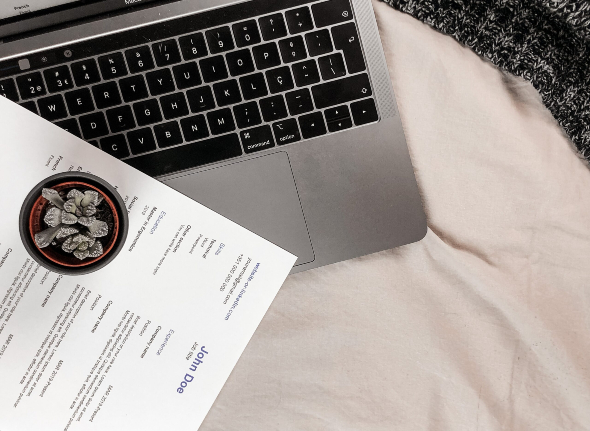How do I apply for my first job?
What you will need to do to land your ideal first job


The Curriculum Vitae
Need help with writing an impressive CV? No worries! This guide has got you covered. Discover valuable tips and useful links to create a standout CV that grabs employers’ attention.
How to write and format a CV
There are a lot of different ways to write and present a CV, and you can get lots of help on how to do this from jobhunting websites and similar. It’s essential that you write your CV to fit the job that you are applying for, but they will all have the same basic elements:
CV header: This is where you put your name and contact information. Use a sensible email address based on your real name, make a new one if necessary (Outlook and Google offer free emails). Don’t include personal information like material status, your photo or your date of birth.
Personal statement: A personal statement is also known as a personal profile or career objective. It’s a short paragraph designed to grab the recruiter’s eye and show that you are the best candidate for the job. It would help if you mentioned your motivation, and explain why you want to work this job for this company. It seems obvious, but you shouldn’t lie about your ambitions and skills.
Work experience: This is where you list your professional experience. In a chronological CV, this section has the starring role so give it the attention it deserves. Put your most recent job first then follow up with its previous roles. Also, you can showcase your achievements but remember it’s not about what you do, it’s about how well you can do it.
Education: If you’re writing a student CV, or you’ve just graduated then your education would go before your work experience, immediately after your personal statement. If you’ve just left school, then include your GCSEs and A-Levels. Always specifically mention obtaining Maths and English as for many jobs these are considered essential. Other subjects can be included if they’re relevant.
Skills: This demonstrates how well you can perform tasks at work, your effectiveness in workplace scenarios and your expertise related to your profession. Read the job description and make a list of skills that are relevant to the role. Then list your own skills, compare them, and be sure to include any that match.

The Curriculum Vitae
Need help with writing an impressive CV? No worries! This guide has got you covered. Discover valuable tips and useful links to create a standout CV that grabs employers’ attention.
How to write and format a CV
There are a lot of different ways to write and present a CV, and you can get lots of help on how to do this from jobhunting websites and similar. It’s essential that you write your CV to fit the job that you are applying for, but they will all have the same basic elements:
CV header: This is where you put your name and contact information. Use a sensible email address based on your real name, make a new one if necessary (Outlook and Google offer free emails). Don’t include personal information like material status, your photo or your date of birth.
Personal statement: A personal statement is also known as a personal profile or career objective. It’s a short paragraph designed to grab the recruiter’s eye and show that you are the best candidate for the job. It would help if you mentioned your motivation, and explain why you want to work this job for this company. It seems obvious, but you shouldn’t lie about your ambitions and skills.
Work experience: This is where you list your professional experience. In a chronological CV, this section has the starring role so give it the attention it deserves. Put your most recent job first then follow up with its previous roles. Also, you can showcase your achievements but remember it’s not about what you do, it’s about how well you can do it.

Education: If you’re writing a student CV, or you’ve just graduated then your education would go before your work experience, immediately after your personal statement. If you’ve just left school, then include your GCSEs and A-Levels. Always specifically mention obtaining Maths and English as for many jobs these are considered essential. Other subjects can be included if they’re relevant.
Skills: This demonstrates how well you can perform tasks at work, your effectiveness in workplace scenarios and your expertise related to your profession. Read the job description and make a list of skills that are relevant to the role. Then list your own skills, compare them, and be sure to include any that match.
“Don’t forget, the people who will be reading your application had to apply for their job once too.”
The Job Interview
Your CV did the trick, and now you’ve got to prepare for your interview. Here are some tips and links below that will ensure you have the best chance of landing your dream job.
How to approach a job interview
How to ensure you have the best chance of landing your dream job when in an interview:
Follow these top tips, which include:
- Research the company and your interviewers.
- Practice your answers to common interview questions.
- Be prepared with examples of your work.
- Prepare smart questions for your interviewers.
Start the conversation with a strong and positive greeting and introduction. When you first meet the interviewer, smile, address them by their name and reach out for a confident handshake. Maintain a friendly and approachable tone. Take time at the beginning of the interview to have a casual conversation about things unrelated to the job. At the start of your interview, observe and listen.
During the interview, be prepared to answer common questions, even the uncomfortable ones. At the end of the interview, be sure to leave the interviewer with a positive feeling about you and the conversation.
The Job Interview
Your CV did the trick, and now you’ve got to prepare for your interview. Here are some tips and links below that will ensure you have the best chance of landing your dream job.
How to approach a job interview
How to ensure you have the best chance of landing your dream job when in an interview:
Follow these top tips, which include:
- Research the company and your interviewers.
- Practice your answers to common interview questions.
- Be prepared with examples of your work.
- Prepare smart questions for your interviewers.
Start the conversation with a strong and positive greeting and introduction. When you first meet the interviewer, smile, address them by their name and reach out for a confident handshake. Maintain a friendly and approachable tone. Take time at the beginning of the interview to have a casual conversation about things unrelated to the job. At the start of your interview, observe and listen.
During the interview, be prepared to answer common questions, even the uncomfortable ones. At the end of the interview, be sure to leave the interviewer with a positive feeling about you and the conversation.
Related

What are digital skills and how do I get them?
[rt_reading_time...

Enjoy gaming? Find out how it could build you a career
[rt_reading_time...

